Hope runs deep, rebuilding confidence among Syrian women refugees
UN Women’s Executive Director visited UN Women’s Oasis, a safe space for women to seek support and skills training in Jordan’s Zaatari Refugee Camp.Date:
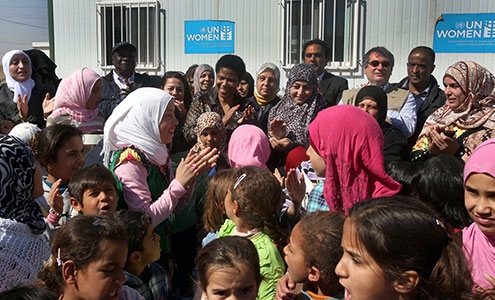
Amman, Jordan — The sound of young voices greeted UN Women’s Executive Director, Phumzile Mlambo-Ngcuka as she entered the gates of the Women and Girls Oasis, located in Jordan’s Zaatari Refugee Camp, close to the Syrian border.
In this safe space for women and children, girls and boys were singing a song of hope and peace for Syria while mothers engaged in the various programmes on offer that day, such as sewing and jewelry-making.
One young girl reached out to Ms. Mlambo-Ngcuka saying: “Madam, I have lost my older brother a few days ago; what I can do?”
UN Women’s top official immediately hugged her and said, “We are all supporting you; do not cry young girl. As you grow up each day, you will find a lot of people around you.”
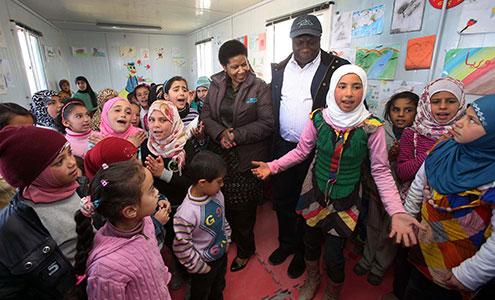
The Zaatari Refugee Camp currently hosts about 120,000 Syrians, according to the UN Refugee Agency, with women making up approximately 55 per cent of 55 per cent of the population.
Opened as a pilot project in the fall of 2012, UN Women’s Oasis is a safe space for women to seek support, regain their strength and access the tools they need to participate actively in camp life, as well as to plan for their future.
The programming at the Centre was developed in consultation with Syrian women. They help run the programme, and their hope and determination have played a critical part in making it a success.
Several Syrian women said the Oasis offers them a place where they can regain their confidence and dignity.
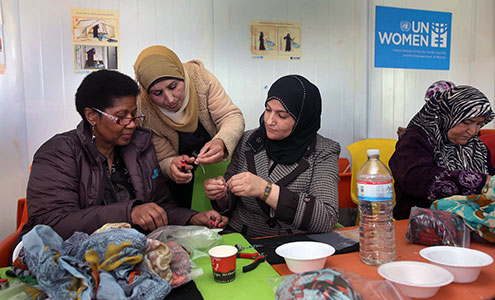
“Every month there are about 800 women that come for the different programmes. In addition to the skills they gain here, they get the chance to talk to each other, building connections and finding shared solutions to problems,” said Melinda Wells, Head of the UN Women Humanitarian team in Jordan.
“We try our best to follow their lead; they are the experts on what they need to build the skills and capacity to face their challenges right now in the Camp, and in everything that comes after,” she added.
“Yes, you gave us hope; thanks for that,” said Rana Sais, a 32-year-old woman from Daraa, a city near the Jordanian border where the civil unrest began in March 2011.
Describing the Oasis as “a source of hope,” Ms. Sais called for the opening of similar centres and enlarging the current one to upgrade its capacity.
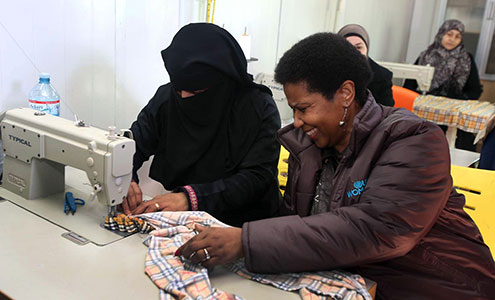
“UN Women has made us feel productive, as the income we get from these activities is helping improve the lives of our families,” Ms. Sais added. “We want to have more families and women benefiting from such activities.”
Ms. Mlambo-Ngcuka also received pleas from the women refugees to lobby the international community to provide more assistance for the people facing the war in Syria. She pledged to call for greater support for the work of international and Jordanian agencies, and praised the resilience and dedication of Syrian women.
“We can support even more people, both Jordanians and Syrians, and prove that this model of cooperation can work,” Ms. Mlambo-Ngcuka said. “But the most important thing is to have peace in Syria, the biggest thing we can give these women is the possibility to go back to a peaceful Syria.”
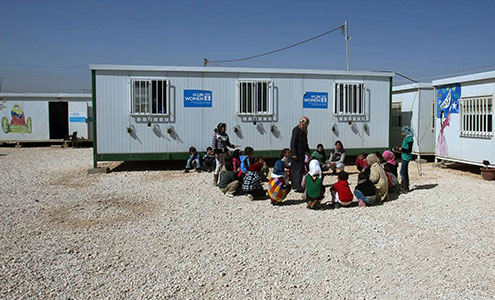
Related links:
Video: Women of Syria: An appeal for peace
Syrian women graduate from vocational training programme at Za’atari Refugee Camp
Syrian women refugees face forced early marriages and restricted mobility: UN Women report
Syrian Women Refugees Stitch Together Trust and Hope
Flickr set of UN Women Executive Director’s visit to Jordan, and the Zaatari camp